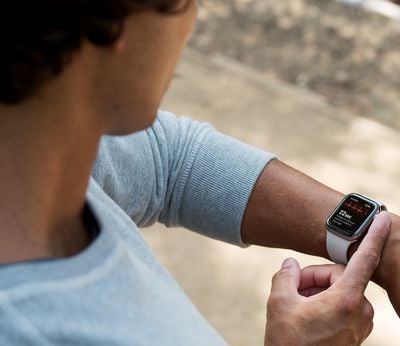Apple today announced that its ECG app will be available on the Apple Watch Series 4 today as part of watchOS 5.1.2. Alongside that news, TIME has published a new interview with Apple's CEO Tim Cook and COO Jeff Williams.

The article begins with a story about 46-year-old Texas resident Kevin Foley, who was having trouble breathing normally during a movie. Fortunately, since he was wearing an Apple Watch and participating in the recent Apple Heart Study, he was alerted to signs of an irregular heartbeat and went to the emergency room.
At the hospital, doctors hooked Foley up to an ECG machine and found signs of atrial fibrillation, an irregular heartbeat that can lead to stroke and other potentially fatal complications. Foley spent the next few days in the hospital while doctors worked to return him to a normal sinus heart rhythm and is doing fine now.
"Apple's largest contribution to mankind will be in improving people's health and well-being," Cook boldly proclaimed.
"We have tens of millions of watches on people's wrists, and we have hundreds of millions of phones in people's pockets," said Williams. "There's a huge opportunity to empower people with more information about their health. So this is something we view as not only an opportunity, but a responsibility of ours."
Williams also appeared on CBS This Morning today to talk about the ECG app. The YouTube video can only be streamed in the United States.
The report says a traditional hospital ECG is often referred to as a "12-lead" machine, as its 10 different electrodes provide information on 12 different areas of the heart. The new Apple Watch is the equivalent of only a single-lead device, but research suggests the ECG app is still very accurate.
In a press release, Apple said the accuracy of its ECG app was validated in a clinical trial with around 600 participants. The study found the ECG app on Apple Watch demonstrated 98.3 percent sensitivity in classifying atrial fibrillation:
Rhythm classification from a gold standard 12-lead ECG by a cardiologist was compared to the rhythm classification of a simultaneously collected ECG from the ECG app. The study found the ECG app on Apple Watch demonstrated 98.3 percent sensitivity in classifying AFib and 99.6 percent specificity in classifying sinus rhythm in classifiable recordings. In the study, 87.8 percent of recordings could be classified by the ECG app.
"The FDA has been very rigorous, and they should be," said Williams, referring to the Apple Watch's heart health features.
The article goes on to claim that some cardiologists and other experts have raised concerns that the Apple Watch's ECG feature is "unnecessary for the general population" and "could cause problems," including false positives.
"If everybody with an Apple Watch and an alert from an Apple Watch went to a heart-rhythm doctor that was super comfortable with this, then I think it would be O.K.," said Dr. John Mandrola, a cardiac electrophysiologist. "But there are going to be millions of people going to the doctor that in many cases will be just fine."
Apple responded that no medical test is 100 percent accurate, so some false positives are inevitable, according to the report. Moreover, the Apple Watch will only alert users to a potential heart-related problem if it detects five instances of what it considers a cardiovascular episode, including arrhythmia.
Importantly, in an internal document obtained by MacRumors, Apple cautioned that the ECG app is "not intended to be a diagnostic device or to replace traditional methods of diagnosis," and "should not be used to monitor or track disease state or change medication without first talking to a doctor."
To take an ECG reading from the Apple Watch, users will need to place a finger on the Digital Crown while wearing the watch. The reading is completed in 30 seconds, allowing users to determine whether their hearts are beating in a regular pattern or if there are signs of atrial fibrillation.
Irregular heart rhythm notifications will also be available on Apple Watch Series 1 through Series 4 models in watchOS 5.1.2.
Apple says the setup process for these heart health features will include details about who can use the features, what the features can and cannot do, what results users may get and how to interpret them, and instructions for what to do if users are feeling symptoms that require immediate medical attention.
watchOS 5.1.2 should be available through the Apple Watch app on a paired iPhone around 10:00 a.m. Pacific Time as usual. At launch, the ECG app will be limited to the U.S., but Apple is likely working to get regulatory clearance elsewhere.























